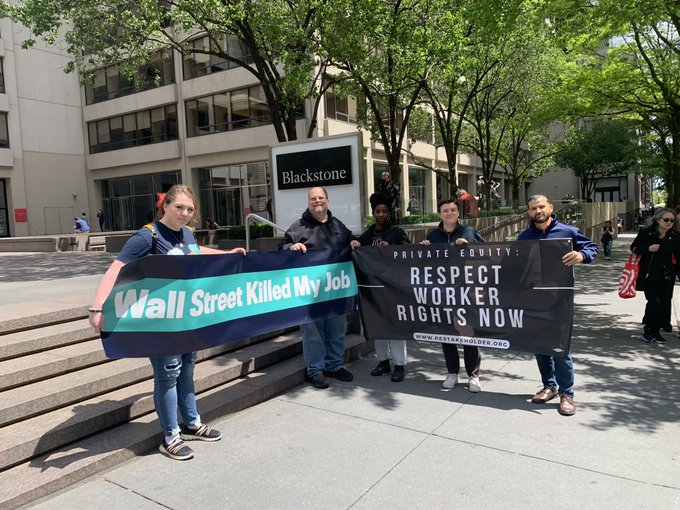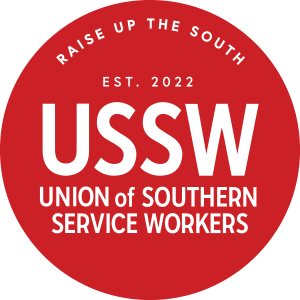Click here to sign on to PESP’s platform for Labor Rights.
Download a copy of our Labor Rights platform here.
The private equity industry must correct its course and improve its treatment of workers. Focused on growing cash flows at the companies they buy, private equity firms have often taken a low road approach and sought to reduce wages, benefits, and staffing at firms they acquire – with devastating consequences to millions of workers, their families and entire communities. The industry manages $11 trillion in assets and owns companies that employ more than 11.7 million American workers, plus millions more around the world.
1) A Sustainable Living Wage
2) Protections in the Event of Layoffs
3) Paid Sick Leave and Affordable Healthcare
4) A Commitment to End Occupational Segregation
5) A Workplace Free of Discrimination and Harassment
6) Safe Working Conditions
7) Equitable Scheduling and Hours of Work
8) The Right to Organize Free of Intimidation and Harassment
9) A Voice for Workers
10) Protection from Technology that Unnecessarily Undermines Working Conditions
Responsibility of Public Pension Funds and other Institutional Investors Workers’ retirement savings in the form of pension funds make up the largest investor group funding private equity firms. Pension funds and other investors should consider the risks of investing with anti-worker private equity firms and take responsibility for ending abusive practices at companies they are invested in through private equity. We call on investors to establish enforceable mechanisms to ensure their investments can manage human capital risks and avoid supporting unethical labor practices.
Background on Private Equity’s Impact on Workers and Jobs
Private equity-owned companies employ millions of workers in the United States, and the number continues to grow as private equity firms are acquiring additional companies at a record pace.
The largest number of workers employed by private equity-owned companies are concentrated in industries where employers often pay low wages – at least 1.5 million workers in Food Service, 1.1 million workers in Retail, and almost 1 million in both Security and Healthcare.
For example, in December 2020, Roark Capital acquired Dunkin’ Donuts, bringing the total number of workers at its companies or franchisees to almost 1 million.
In 2022, the Warburg Pincus-owned Allied Universal Security acquired G4S and now has over 800,000 workers globally.
In 2021 and 2022, Apollo Global Management has almost doubled the number of employees at its companies to over 550,000 through acquisitions such as its buyout of Alorica, a call center operator with 100,000 workers, and Michael’s craft stores with 45,000 workers.
In 2017, Sycamore Partners Management acquired the retail giant Staples, Inc, adding over 75,000 workers employed by private-equity controlled companies.
Private equity takeovers often result in significant job losses and decreases in average worker wages at the companies they buy. Private equity-owned retail companies have laid off hundreds of thousands of workers due to store closures and bankruptcies.
Private Equity Labor Rights Platform
1) A Sustainable Minimum Wage – The private equity industry is large enough to dominate wage markets. As such, PE firms should commit to pay the equivalent of US prevailing wages (as set by the SCA or the DBA) with a $25 floor, plus the accompanying fringe benefit rate. Studies have shown that prevailing wages help close racial wealth gaps, raise standards for women workers, lift families out of poverty, and increase productivity while reducing injury rates.
2) Equitable Scheduling and Hours of Work – It is imperative that private equity companies adopt policies that provide for a minimum amount of work hours and reliable work schedules for all employees, and discourage labor policies that result in precarious work schedules for employees.
3) Paid Sick Leave and Affordable Healthcare – Private equity-owned companies employ millions of workers in industries where the majority of workers lack paid sick leave and paid family leave. This is especially disturbing considering that these are also frontline workers who have worked through the pandemic. Private equity firms should ensure that the companies they own protect American workers and the public’s health by providing paid sick leave, paid family leave, and healthcare coverage for their employees.
4) A Commitment to End Occupational Segregation – More than half of Fortune 500 companies now disclose data on the racial and ethnic composition of their workforces, recognizing this is a critical step to ending systemic bias in US employment. Given the size and diversity of the private equity economic footprint, private equity firms should develop recruitment and retention plans for their portfolio companies that lay out concrete goals for hiring BIPOC, LGTBQ+, women, and workers with disabilities, and in the interest of transparency and accountability, they should make those plans publicly available.
5) A Workplace Free of Discrimination and Harassment – Private equity firms must commit to the elimination of discrimination in employment and occupation at all of their companies. Private equity firms should lay out concrete plans to ensure equal pay and lay out policies to thoroughly investigate and resolve cases of workplace harassment. These policies should include a clear and equitable path to promotion for all employees at a private equity firm’s properties. These policies should also ensure all portfolio companies do not require employees to disclose their criminal history as a condition of employment.
6) Safe Working Conditions – Private equity firms should ensure that all direct and contracted employees of their portfolio companies have safe working conditions and the training and protective equipment they need to do their jobs safely.
7) Protections in the Event of Layoffs – Since private equity-owned companies are prone to bankruptcies and layoffs, private equity firms should commit to provide severance of at least one week’s pay per year of employment to laid off workers.
8) The Right to Organize Free of Intimidation and Harassment – Workers at private equity-owned companies deserve the ability to organize free from intimidation and harassment. Unionized workforces help level the playing field and improve legal compliance, particularly for workers of color and during times of unexpected crisis such as during the pandemic. Private equity companies should ensure all portfolio companies remain neutral towards concerted activity and do not engage in union avoidance.
9) A Voice at Work – Across a wide range of workplace issues, employees indicate that they don’t have as much say on the job as they should. While there’s no one size fits all approach to increasing worker voice, bills like the Accountable Capitalism Act and the Reward Work Act would give workers the right to choose a portion of the board of directors. Private equity firms should increase worker’s voice by experimenting with practices like employees voting on board members and serving on the board. A study of 15 European countries over a decade showed that firms with workers on the board have more profitable acquisitions and are 30 percent less likely to have layoffs after a merger.
10) Protection from Technology that Unnecessarily Undermines Working Conditions – Companies are turning to new technologies to improve efficiency, but these technologies may be used in ways that harm workers. When workers are subjected to constant surveillance and automated management, studies have confirmed what workers report: turnover, injuries, and anxiety increase under the constant threat of termination and discipline. Private equity firms should inform stakeholders when portfolio companies adopt new technologies and include an assessment process with public findings on how this will impact job quality, employee well-being, the right to organize, and job totals. As new tech-related jobs are created, companies should commit to giving priority to existing staff or potentially displaced staff for training and promotions. How workplace data is used, accessed, and restricted should be monitored and general partners should establish worker rights and protections related to surveillance, automated management, and other technology.
For more information on the Private Equity Labor Rights Platform or to sign on in support of these key worker protections, contact PESP at [email protected]
Please sign on to the Private Equity Labor Rights Platform here:












